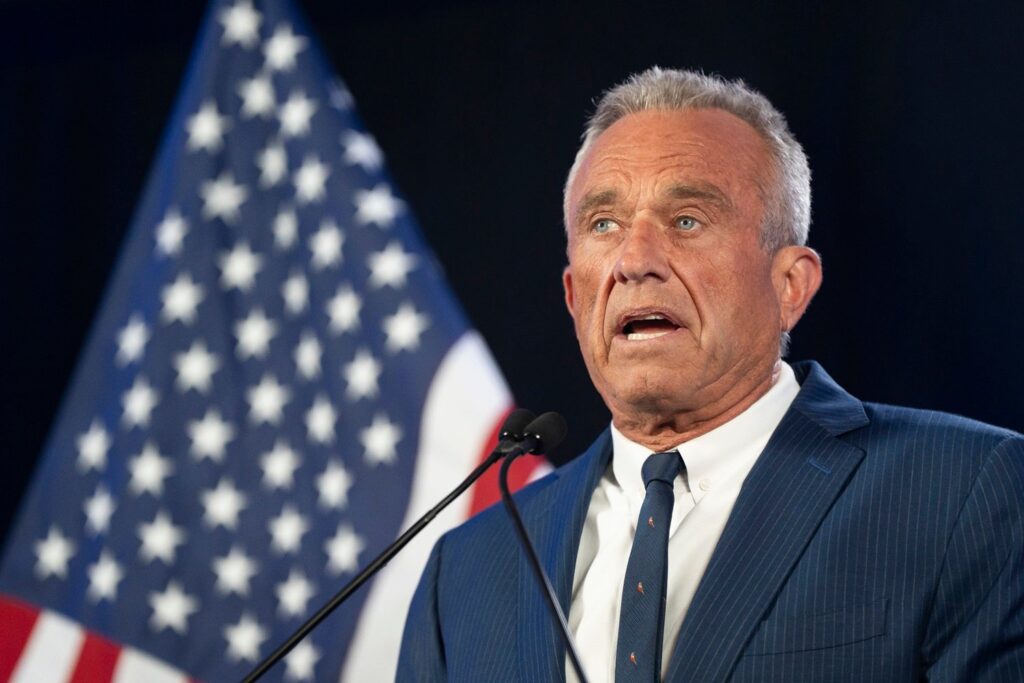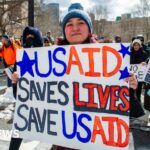Well that didn’t take long. Robert F. Kennedy Jr., the just-enshrined director of the Department of Health and Human Services, has already signaled that he may try to change the country’s vaccination schedule for children.
RFK Jr. made the remarks during his speech at a ceremony held on Tuesday welcoming him as the new HHS secretary. He announced that he would form a commission to study the childhood vaccine schedule as a possible factor for the increase of chronic diseases in Americans, among other supposedly “taboo” subjects. Kennedy earlier appeared to promise Republican lawmakers that he would not change the current vaccine recommendations established by the Centers for Disease Control and Prevention. To be clear, RFK Jr. didn’t explicitly say he would change the vaccination schedule, but by setting up this commission, he’s laying the groundwork for that possibility.
Last Thursday, Kennedy received the Senate’s blessing for his nomination to HHS in a mostly party-line vote (Kentucky Senator Mitch McConnell was the lone Republican “no”); later that day, he was officially sworn in as the new leader of the federal agency that oversees the CDC, the Food and Drug Administration, and other agencies that protect the country’s public health. But RFK’s ascension was initially far from certain.
The former environmental lawyer endured blistering questions about his long history of supporting the anti-vaccination movement during Senate committee hearings over his nomination. And there were several Republican senators who expressed unease about his fitness for the position given his stance on vaccines. The most prominent of these critics was Louisiana Senator Bill Cassidy, a former physician and a member of the U.S. Senate Finance Committee.
A week prior to the larger Senate vote, however, Cassidy changed his mind about RFK Jr. and delivered the pivotal tiebreaker vote to secure the Finance Committee’s endorsement of Kennedy’s nomination. In his floor speech, Cassidy said that he was swayed by assurances from both Kennedy and Trump that he would protect the public health benefits of vaccination. At one point, Cassidy explicitly said that Kennedy would “maintain the Centers for Disease Control and Prevention’s Advisory Committee on Immunization Practices’ recommendations without changes.”
Cassidy, for his part, said in a social media post Wednesday that he does not see RFK’s announcement as going back on his promise.
The commitments I received from RFK Jr. and the administration never precluded him from conducting sound scientific research. I’m confident any reputable review will further confirm settled science of the safety and efficacy of the childhood vaccine schedule. The outbreak in West…
— U.S. Senator Bill Cassidy, M.D. (@SenBillCassidy) February 19, 2025
The Advisory Committee on Immunization Practices, or ACIP, is a panel of outside experts assembled by the CDC. Their recommendations, formally adopted by the CDC, strongly influence which vaccines are routinely provided to the public. For instance, states often mandate that children have to receive vaccines universally recommended by the ACIP, such as the measles, mumps, and rubella vaccine, before they can enter public school. Insurance plans are also typically required to cover ACIP-recommended vaccines without any cost-sharing.
The ACIP’s newest members were enshrined just before Trump took office, and it’s likely that these members and the ACIP as a whole would resist a direct attempt to have their recommendations unduly influenced by RFK Jr. or the Trump administration, at least for now. But it’s still possible that these new members will not be allowed to join the ACIP, and/or that existing members will be forced off to make room for people more in line with RFK Jr.’s thinking. Either way, despite his promise to Senator Cassidy, RFK Jr. now seems poised to at least try to undermine, or potentially disrupt, the country’s standing vaccine policies.
On the same day as Kennedy’s swearing in, the Trump administration issued an executive order establishing the “Make America Healthy Again” commission—a reference to one of Kennedy’s slogans deployed during his earlier failed presidential run. The order calls for the federal government to take action in lowering Americans’ rates of chronic diseases and ending childhood chronic disease altogether. Under the umbrella of this executive order, Kennedy promised on Tuesday that the commission will investigate “formerly taboo or insufficiently scrutinized” possible factors for the rise in chronic disease.
Alongside the childhood vaccine schedule, Kennedy also brought up electromagnetic radiation, certain pesticides, ultra-processed foods, anti-depressant medications, and microplastics as other potential culprits for chronic disease, adding that nothing would be “off-limits.”
Studies have tied some of these named factors to potential health issues, such as endocrine-disrupting chemicals like PFAS. But agencies like the FDA have already acknowledged the potential harms of PFAS and similar substances, and scientists are working to better understand these harms. Other factors like electromagnetic radiation have also been studied, though without much to show for it. High-frequency electromagnetic fields—the kind we use for X-rays—are well-known to be dangerous with too much exposure. But studies generally haven’t supported a link between non-ionizing EMFs—the more common kind emitted by our cell phones and other household appliances—and negative health effects, including cancer.
And to be clear, there is no solid evidence that our current vaccination schedules are harming us, or that getting too many vaccines at once is causing chronic diseases in children (a common canard of the anti-vaccination movement).
Throughout his speech, Kennedy argued that his commission would do its utmost to carefully study these factors. “Whatever belief or suspicion I have expressed in the past, I’m willing to subject them all to the scrutiny of unbiased science,” Kennedy said.
Unfortunately, any cursory look at Kennedy’s track record would throw that assurance into question. For at least 20 years, RFK Jr. has repeatedly misrepresented the evidence on vaccine safety and other important health issues, even after his work has been picked apart by actual scientists (and even retracted once). Now that he’s been given a blank check to sway the country’s public health agenda to his liking, it’s hard to see how that stubbornness to reality will lessen to any degree.







